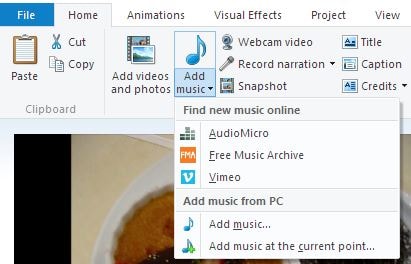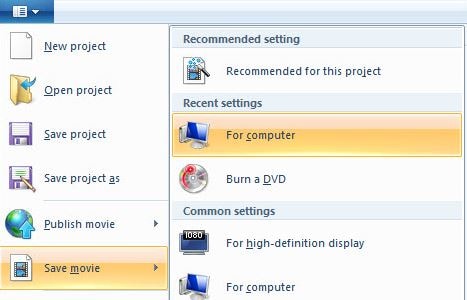
Updated 2024 Approved 5 Leading Digital Audio Workstation Options for Professional Guitarists, Updated

“5 Leading Digital Audio Workstation Options for Professional Guitarists, Updated “
Digital Audio Workstations (DAW) is the basic need for music artists to record and share it with their fans and listeners. The guitar recording software plays a pivotal role in producing and editing audio to make it ready for the outside world. The article takes complete responsibility for featuring five guitar recording software with their features. So, let us begin. Shall we?
Part 1: 5 Best Guitar Recording Software in 2024
Are you ready to jump into this subsection? You should be! The following section shall make your life easy and bearable. You can take our word for it.
The choice of the best guitar recording software is essential. It is because the software is pretty much the basis for a successful music career. Don’t you agree? The sub-section reflects upon two things. Introducing the five exceptional Digital Audio Workstations and their features with it. So, why wait? Let us dive right in!
FL Studio
FL Studio guitar recording software used to be known as the Fruity Loops. FL Studio is the ideal key for you to produce amazing beats most effortlessly. One of the workable features of FL Studio revolves around its songwriting. The software plays a phenomenal role acting as a powerful loop-based songwriting and creation tool.
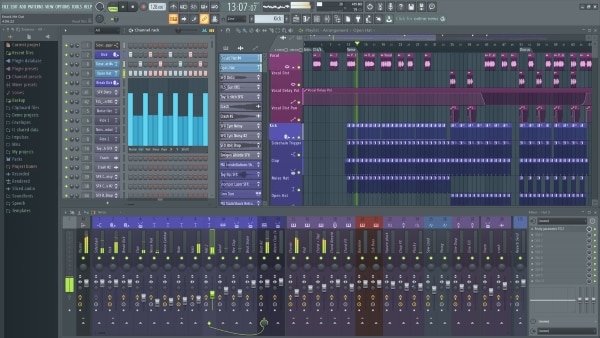
Before knowing how to record guitar on PC, it is important to understand the workable functions of FL Studio. The user is free to build a drum beat, lay down a chord progression, and create a melody. The channel effects help with the final output by offering compression, saturation, equalization, and reverb.
The floating mixer window creates dynamic arrangements through the panning, rises, falls, and focal points. Want to know more features of FL Studio? Follow our lead!
- 11 synths and nine drum machines help you control your music.
- The VST and AU support accommodates the virtual instrument and effects libraries as you expand.
- The visible automation clips can be manipulated easily.
Let us move to the next guitar recording mic tool! Are you ready?
Ableton Live
Ableton Live is a guitar recording software that is compatible with both Mac and Windows. The software is ideal for a creative professional to access latency-free backing tracks with virtual instrumentation. Ableton Live can be counted upon to offer a streamlined interface with a reasonable price and is perfect for a beginner.
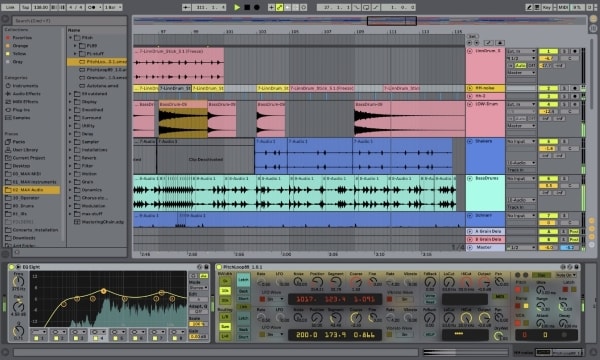
Before stepping into how to record guitars, it is mandatory to know what this Digital Audio Workstation brings to the table. Ableton Live constitutes a diverse range of audio and MIDI effects, more than 1500 sounds, and whatnot. The session and arrangement view of Ableton Live compels the artists to start building music and sounds.
Are you looking for more? Continue exploring the tool!
- The Help view provides the user with tutorials and tips starting from track setup, settings to quantization.
- There are around 15 software instruments that help you create magic in the music world.
- The mode overlay is facilitated with the highly interactive help view.
Did you come here to learn about Cubase? Worry no more! We are moving on to the next guitar recording software!
Cubase
Cubase has to be your best bet if you are serious with your career. Allow us to introduce the readers to a powerful mixer and comprehensive editing software! At the moment, Cubase guitar recording software is the leading recording and editing application. You are free to start creating your music and bring your production and editing skills to the next level.
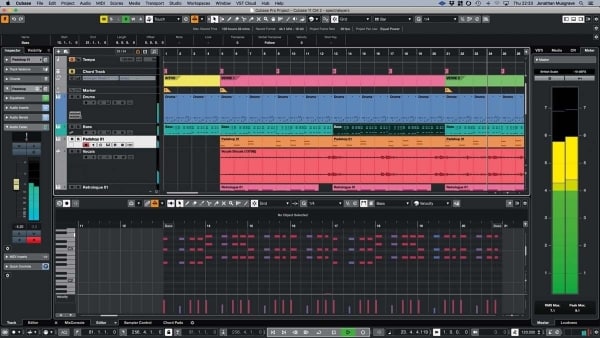
Before focusing on how to record electric guitar, let us keep you warm by offering what you are looking for. Cubase comes up with an interface that has traditional hardware models. You can go hands-free as well. Additionally, get ready to make virtual guitar amps.
It has all the features that a composer seeks in their Digital Audio Workstation. Cubase has more to offer. Follow the pointers below to know!
- The multiple audio effects make the process easy and productive.
- The popular guitar plugins have made Cubase a renowned name in the music era.
- Cubase supports ARA, AFA, MediaBay, and Chord Assistant.
Are you a fan of Logic Pro X? Let us embark on a journey to know their traits! Shall we?
Logic Pro X
Logic Pro X is another guitar recording software that got famous in a short time. Accepted and used by guitar lovers and music creators, Apple Logic Pro X is a strong software, especially for multi-touch mixing. The application provides the music addicts with the Drummer feature to collaborate with a skilled beat programmer.

The guitar recording mic has a professional touch to it. The users are expected to find the right blend of samples and loops as it will help make the song sections . The song sections then aid in producing the magic song. The large array of bundled instruments and effects greatly gives the user value for money.
With effective spatial audio tools and Dolby Atmos, Logic Pro X compels you to get creative and comfortable at the same time. Are you craving to know the characteristics of Logic Pro X? Resume scrolling the tool!
- Use the software for professional songwriting, editing, mixing, and creating a beat.
- The Logic Remote function helps control the music-making sessions from iPad and iPhone.
- The creativity is fueled by accessing a massive collection of plugins and sounds.
Let us move on to the next magical software! Are you excited about this journey?
Apple GarageBand
Available for every Mac and iOS user, Apple GarageBand guitar recording software is one of its kind. If you are into music production and looking for a straightforward tool, you know the answer now! With an integrated and streamlined interface, novice musicians can find this tool as their best bet. The single multipaned window lets the user set up the workplace effortlessly.
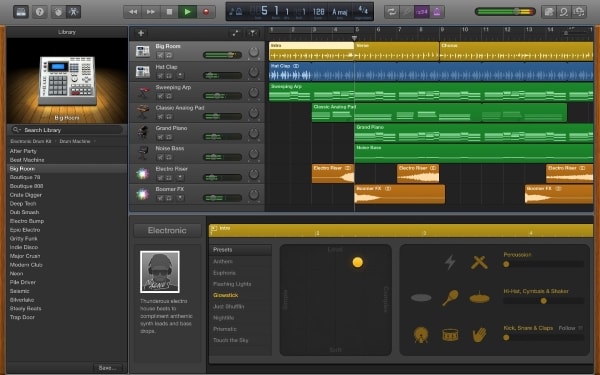
Apple GarageBand comes up with a built-in virtual drummer, various sounds to play, and Apple Loops. There are also some great lessons for guitar and piano. It aids you to progress with the instrument of your liking. More importantly, you can create human-sounding drum tracks or access an impeccable array of realistic amps with sounds.
Following are some additional attributes of Apple GarageBand. Let us have a peek!
- There is a sound library, presets for guitar and voice, and session drummers.
- The Live Loops makes it fun to develop electronic music.
- The multi-touch gestures, DJ-style transitions, and Remix FX allows you to be creative in the process.
Conclusion
Creative professionals like music artists need software that allows them to record their music and edit it. Without such software, it would be hard to achieve a career. The article informed the readers of five guitar recording software, inclusive of their features. Guitarists are expected to make the right decision by setting out their priorities and offerings of the software. Don’t you agree?
Let us move to the next guitar recording mic tool! Are you ready?
Ableton Live
Ableton Live is a guitar recording software that is compatible with both Mac and Windows. The software is ideal for a creative professional to access latency-free backing tracks with virtual instrumentation. Ableton Live can be counted upon to offer a streamlined interface with a reasonable price and is perfect for a beginner.

Before stepping into how to record guitars, it is mandatory to know what this Digital Audio Workstation brings to the table. Ableton Live constitutes a diverse range of audio and MIDI effects, more than 1500 sounds, and whatnot. The session and arrangement view of Ableton Live compels the artists to start building music and sounds.
Are you looking for more? Continue exploring the tool!
- The Help view provides the user with tutorials and tips starting from track setup, settings to quantization.
- There are around 15 software instruments that help you create magic in the music world.
- The mode overlay is facilitated with the highly interactive help view.
Did you come here to learn about Cubase? Worry no more! We are moving on to the next guitar recording software!
Cubase
Cubase has to be your best bet if you are serious with your career. Allow us to introduce the readers to a powerful mixer and comprehensive editing software! At the moment, Cubase guitar recording software is the leading recording and editing application. You are free to start creating your music and bring your production and editing skills to the next level.

Before focusing on how to record electric guitar, let us keep you warm by offering what you are looking for. Cubase comes up with an interface that has traditional hardware models. You can go hands-free as well. Additionally, get ready to make virtual guitar amps.
It has all the features that a composer seeks in their Digital Audio Workstation. Cubase has more to offer. Follow the pointers below to know!
- The multiple audio effects make the process easy and productive.
- The popular guitar plugins have made Cubase a renowned name in the music era.
- Cubase supports ARA, AFA, MediaBay, and Chord Assistant.
Are you a fan of Logic Pro X? Let us embark on a journey to know their traits! Shall we?
Logic Pro X
Logic Pro X is another guitar recording software that got famous in a short time. Accepted and used by guitar lovers and music creators, Apple Logic Pro X is a strong software, especially for multi-touch mixing. The application provides the music addicts with the Drummer feature to collaborate with a skilled beat programmer.

The guitar recording mic has a professional touch to it. The users are expected to find the right blend of samples and loops as it will help make the song sections . The song sections then aid in producing the magic song. The large array of bundled instruments and effects greatly gives the user value for money.
With effective spatial audio tools and Dolby Atmos, Logic Pro X compels you to get creative and comfortable at the same time. Are you craving to know the characteristics of Logic Pro X? Resume scrolling the tool!
- Use the software for professional songwriting, editing, mixing, and creating a beat.
- The Logic Remote function helps control the music-making sessions from iPad and iPhone.
- The creativity is fueled by accessing a massive collection of plugins and sounds.
Let us move on to the next magical software! Are you excited about this journey?
Apple GarageBand
Available for every Mac and iOS user, Apple GarageBand guitar recording software is one of its kind. If you are into music production and looking for a straightforward tool, you know the answer now! With an integrated and streamlined interface, novice musicians can find this tool as their best bet. The single multipaned window lets the user set up the workplace effortlessly.

Apple GarageBand comes up with a built-in virtual drummer, various sounds to play, and Apple Loops. There are also some great lessons for guitar and piano. It aids you to progress with the instrument of your liking. More importantly, you can create human-sounding drum tracks or access an impeccable array of realistic amps with sounds.
Following are some additional attributes of Apple GarageBand. Let us have a peek!
- There is a sound library, presets for guitar and voice, and session drummers.
- The Live Loops makes it fun to develop electronic music.
- The multi-touch gestures, DJ-style transitions, and Remix FX allows you to be creative in the process.
Conclusion
Creative professionals like music artists need software that allows them to record their music and edit it. Without such software, it would be hard to achieve a career. The article informed the readers of five guitar recording software, inclusive of their features. Guitarists are expected to make the right decision by setting out their priorities and offerings of the software. Don’t you agree?
Let us move to the next guitar recording mic tool! Are you ready?
Ableton Live
Ableton Live is a guitar recording software that is compatible with both Mac and Windows. The software is ideal for a creative professional to access latency-free backing tracks with virtual instrumentation. Ableton Live can be counted upon to offer a streamlined interface with a reasonable price and is perfect for a beginner.

Before stepping into how to record guitars, it is mandatory to know what this Digital Audio Workstation brings to the table. Ableton Live constitutes a diverse range of audio and MIDI effects, more than 1500 sounds, and whatnot. The session and arrangement view of Ableton Live compels the artists to start building music and sounds.
Are you looking for more? Continue exploring the tool!
- The Help view provides the user with tutorials and tips starting from track setup, settings to quantization.
- There are around 15 software instruments that help you create magic in the music world.
- The mode overlay is facilitated with the highly interactive help view.
Did you come here to learn about Cubase? Worry no more! We are moving on to the next guitar recording software!
Cubase
Cubase has to be your best bet if you are serious with your career. Allow us to introduce the readers to a powerful mixer and comprehensive editing software! At the moment, Cubase guitar recording software is the leading recording and editing application. You are free to start creating your music and bring your production and editing skills to the next level.

Before focusing on how to record electric guitar, let us keep you warm by offering what you are looking for. Cubase comes up with an interface that has traditional hardware models. You can go hands-free as well. Additionally, get ready to make virtual guitar amps.
It has all the features that a composer seeks in their Digital Audio Workstation. Cubase has more to offer. Follow the pointers below to know!
- The multiple audio effects make the process easy and productive.
- The popular guitar plugins have made Cubase a renowned name in the music era.
- Cubase supports ARA, AFA, MediaBay, and Chord Assistant.
Are you a fan of Logic Pro X? Let us embark on a journey to know their traits! Shall we?
Logic Pro X
Logic Pro X is another guitar recording software that got famous in a short time. Accepted and used by guitar lovers and music creators, Apple Logic Pro X is a strong software, especially for multi-touch mixing. The application provides the music addicts with the Drummer feature to collaborate with a skilled beat programmer.

The guitar recording mic has a professional touch to it. The users are expected to find the right blend of samples and loops as it will help make the song sections . The song sections then aid in producing the magic song. The large array of bundled instruments and effects greatly gives the user value for money.
With effective spatial audio tools and Dolby Atmos, Logic Pro X compels you to get creative and comfortable at the same time. Are you craving to know the characteristics of Logic Pro X? Resume scrolling the tool!
- Use the software for professional songwriting, editing, mixing, and creating a beat.
- The Logic Remote function helps control the music-making sessions from iPad and iPhone.
- The creativity is fueled by accessing a massive collection of plugins and sounds.
Let us move on to the next magical software! Are you excited about this journey?
Apple GarageBand
Available for every Mac and iOS user, Apple GarageBand guitar recording software is one of its kind. If you are into music production and looking for a straightforward tool, you know the answer now! With an integrated and streamlined interface, novice musicians can find this tool as their best bet. The single multipaned window lets the user set up the workplace effortlessly.

Apple GarageBand comes up with a built-in virtual drummer, various sounds to play, and Apple Loops. There are also some great lessons for guitar and piano. It aids you to progress with the instrument of your liking. More importantly, you can create human-sounding drum tracks or access an impeccable array of realistic amps with sounds.
Following are some additional attributes of Apple GarageBand. Let us have a peek!
- There is a sound library, presets for guitar and voice, and session drummers.
- The Live Loops makes it fun to develop electronic music.
- The multi-touch gestures, DJ-style transitions, and Remix FX allows you to be creative in the process.
Conclusion
Creative professionals like music artists need software that allows them to record their music and edit it. Without such software, it would be hard to achieve a career. The article informed the readers of five guitar recording software, inclusive of their features. Guitarists are expected to make the right decision by setting out their priorities and offerings of the software. Don’t you agree?
Let us move to the next guitar recording mic tool! Are you ready?
Ableton Live
Ableton Live is a guitar recording software that is compatible with both Mac and Windows. The software is ideal for a creative professional to access latency-free backing tracks with virtual instrumentation. Ableton Live can be counted upon to offer a streamlined interface with a reasonable price and is perfect for a beginner.

Before stepping into how to record guitars, it is mandatory to know what this Digital Audio Workstation brings to the table. Ableton Live constitutes a diverse range of audio and MIDI effects, more than 1500 sounds, and whatnot. The session and arrangement view of Ableton Live compels the artists to start building music and sounds.
Are you looking for more? Continue exploring the tool!
- The Help view provides the user with tutorials and tips starting from track setup, settings to quantization.
- There are around 15 software instruments that help you create magic in the music world.
- The mode overlay is facilitated with the highly interactive help view.
Did you come here to learn about Cubase? Worry no more! We are moving on to the next guitar recording software!
Cubase
Cubase has to be your best bet if you are serious with your career. Allow us to introduce the readers to a powerful mixer and comprehensive editing software! At the moment, Cubase guitar recording software is the leading recording and editing application. You are free to start creating your music and bring your production and editing skills to the next level.

Before focusing on how to record electric guitar, let us keep you warm by offering what you are looking for. Cubase comes up with an interface that has traditional hardware models. You can go hands-free as well. Additionally, get ready to make virtual guitar amps.
It has all the features that a composer seeks in their Digital Audio Workstation. Cubase has more to offer. Follow the pointers below to know!
- The multiple audio effects make the process easy and productive.
- The popular guitar plugins have made Cubase a renowned name in the music era.
- Cubase supports ARA, AFA, MediaBay, and Chord Assistant.
Are you a fan of Logic Pro X? Let us embark on a journey to know their traits! Shall we?
Logic Pro X
Logic Pro X is another guitar recording software that got famous in a short time. Accepted and used by guitar lovers and music creators, Apple Logic Pro X is a strong software, especially for multi-touch mixing. The application provides the music addicts with the Drummer feature to collaborate with a skilled beat programmer.

The guitar recording mic has a professional touch to it. The users are expected to find the right blend of samples and loops as it will help make the song sections . The song sections then aid in producing the magic song. The large array of bundled instruments and effects greatly gives the user value for money.
With effective spatial audio tools and Dolby Atmos, Logic Pro X compels you to get creative and comfortable at the same time. Are you craving to know the characteristics of Logic Pro X? Resume scrolling the tool!
- Use the software for professional songwriting, editing, mixing, and creating a beat.
- The Logic Remote function helps control the music-making sessions from iPad and iPhone.
- The creativity is fueled by accessing a massive collection of plugins and sounds.
Let us move on to the next magical software! Are you excited about this journey?
Apple GarageBand
Available for every Mac and iOS user, Apple GarageBand guitar recording software is one of its kind. If you are into music production and looking for a straightforward tool, you know the answer now! With an integrated and streamlined interface, novice musicians can find this tool as their best bet. The single multipaned window lets the user set up the workplace effortlessly.

Apple GarageBand comes up with a built-in virtual drummer, various sounds to play, and Apple Loops. There are also some great lessons for guitar and piano. It aids you to progress with the instrument of your liking. More importantly, you can create human-sounding drum tracks or access an impeccable array of realistic amps with sounds.
Following are some additional attributes of Apple GarageBand. Let us have a peek!
- There is a sound library, presets for guitar and voice, and session drummers.
- The Live Loops makes it fun to develop electronic music.
- The multi-touch gestures, DJ-style transitions, and Remix FX allows you to be creative in the process.
Conclusion
Creative professionals like music artists need software that allows them to record their music and edit it. Without such software, it would be hard to achieve a career. The article informed the readers of five guitar recording software, inclusive of their features. Guitarists are expected to make the right decision by setting out their priorities and offerings of the software. Don’t you agree?
Essential Methods: Reprogramming Soundtracks Within Film and Video Material
Video editing is inclusive of editing the audio track. You may be working on background scores, original soundtracks, and different kinds of sound effects. These tasks would need you to edit or replace audio in the video. You may have to mix other audio tracks to have one score. From sound engineering to finely editing every track being mixed, it is an ever expanding and exciting technical niche that will depend largely on a plethora of tools, so in this article, we will let you how to replace audio in video with 2 methods by using Filmora and Windows Movie Maker.
In this article
01 How to replace audio in video with Filmora
02 How to change audio in video with Windows Movie Maker
Part 1: How to replace audio in video with Filmora
The first method, let us explore how you can replace audio in video with Wondershare Filmora.
To begin with, get a free trial copy of Wondershare Filmora .
For Win 7 or later (64-bit)
For macOS 10.12 or later
Step 1. Import file
Open the application and click ‘ Import once you have downloaded and installed Wondershare Filmora. Please search for the relevant video you wish to edit and load it from the hard disk or the specific folder. You can select multiple videos using ‘ctrl’ and clicking on the chosen files.
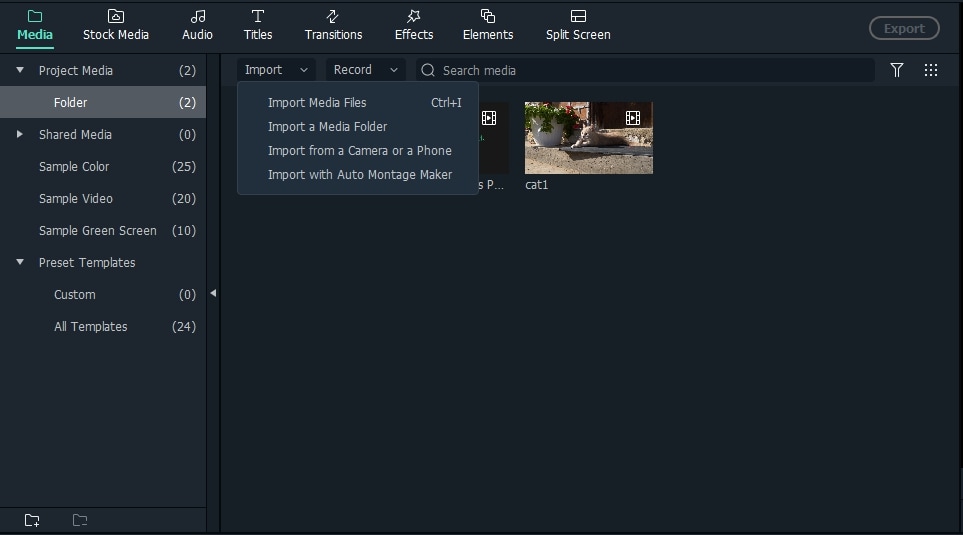
Step 2. Drag and drop to the video Timeline
The videos selected will be displayed as thumbnails. Choose a video, hit and click without releasing the click and drag the chosen video to the Video Timeline.
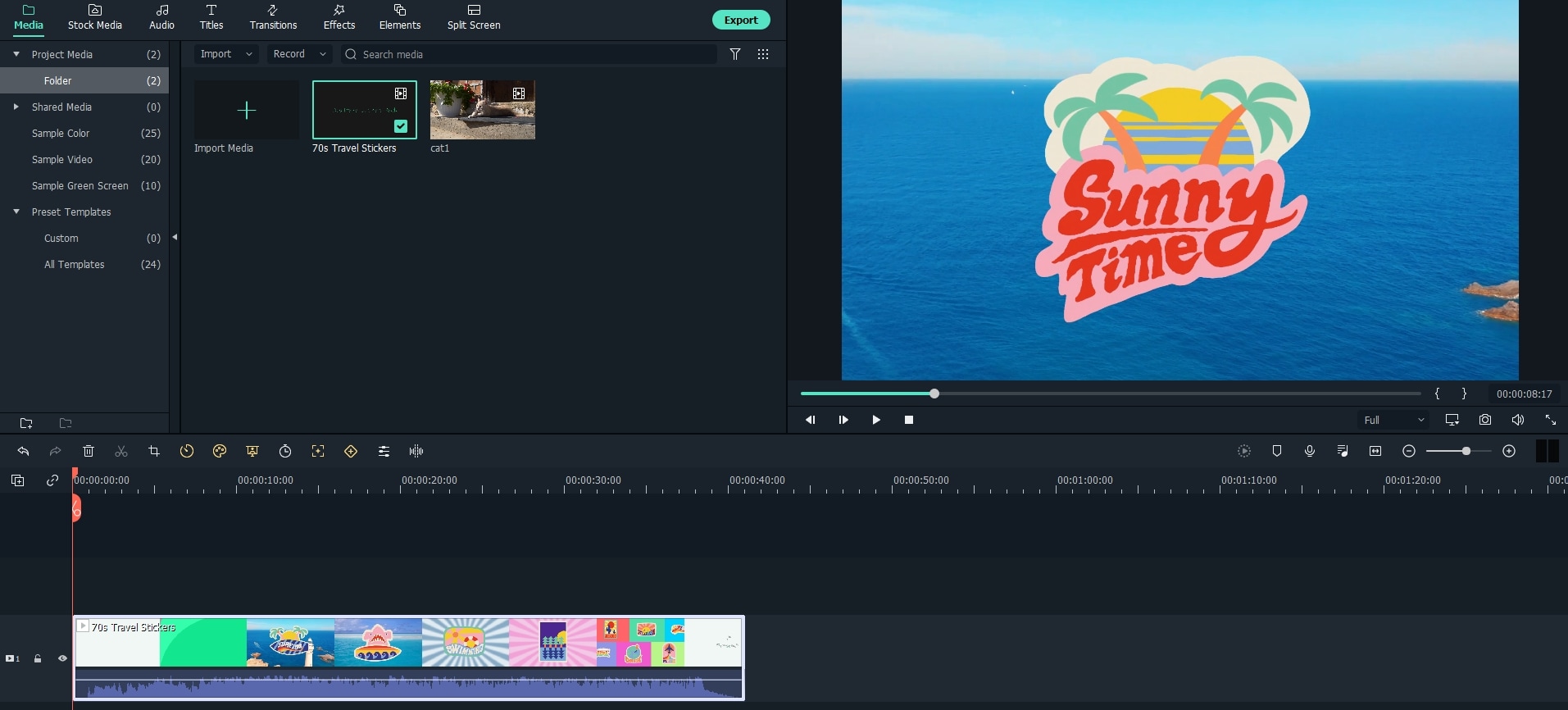
Step 3. Remove the original sound of the video
Right-click on it, and you would see the option of “Audio detach.” Click on it, and the audio file will detach from the video file and get added to Music Timeline.
Press “Delete” on your keyboard, and you will get rid of it. You can save this video without the audio, and you would only have the visuals, unimpaired and unaffected in any way, without the sound.
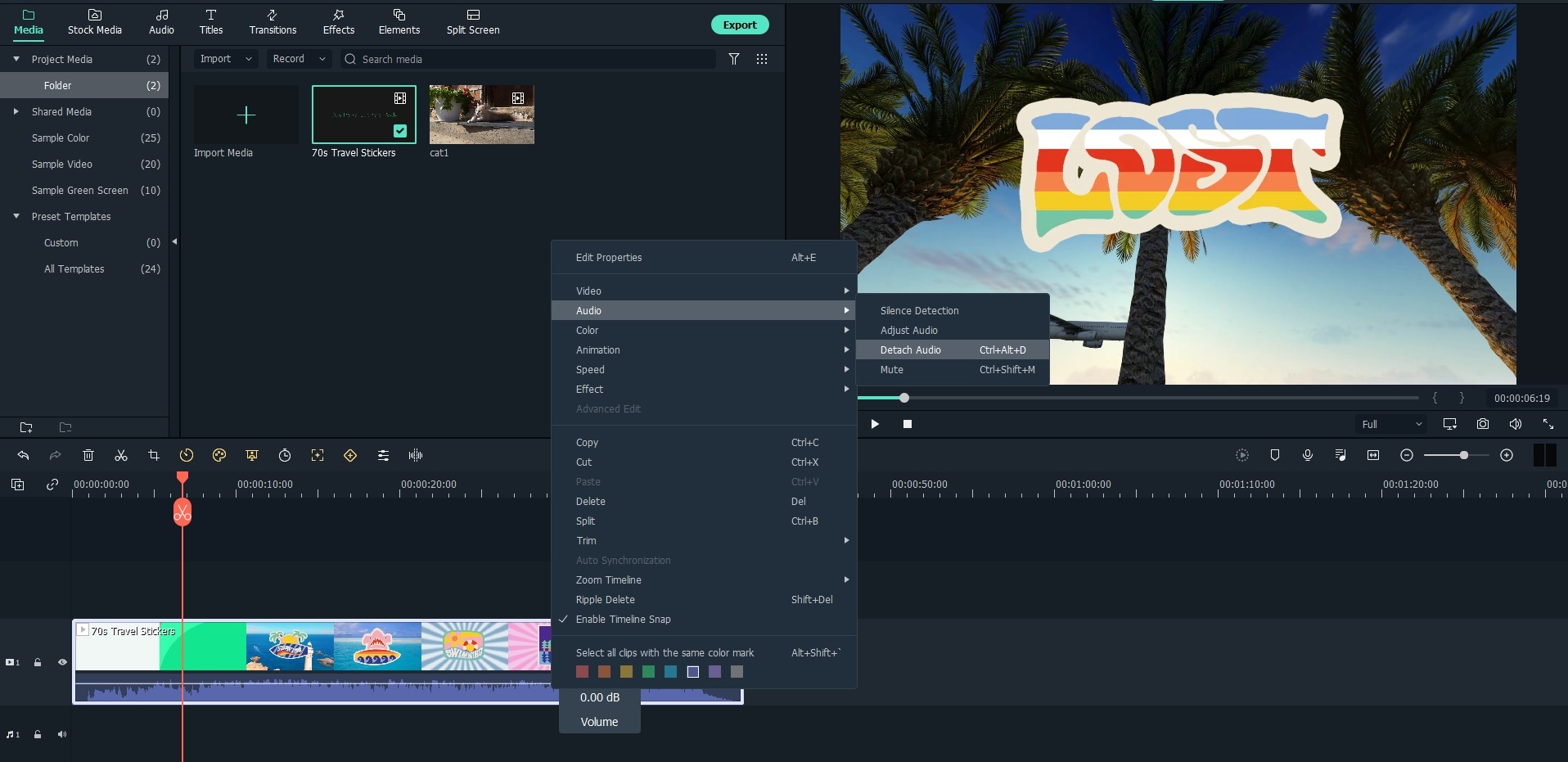
Step 4. Add a new audio track
You can add a new audio track to the video by choosing royalty sound or music from the Filmora library or importing any audio you like.
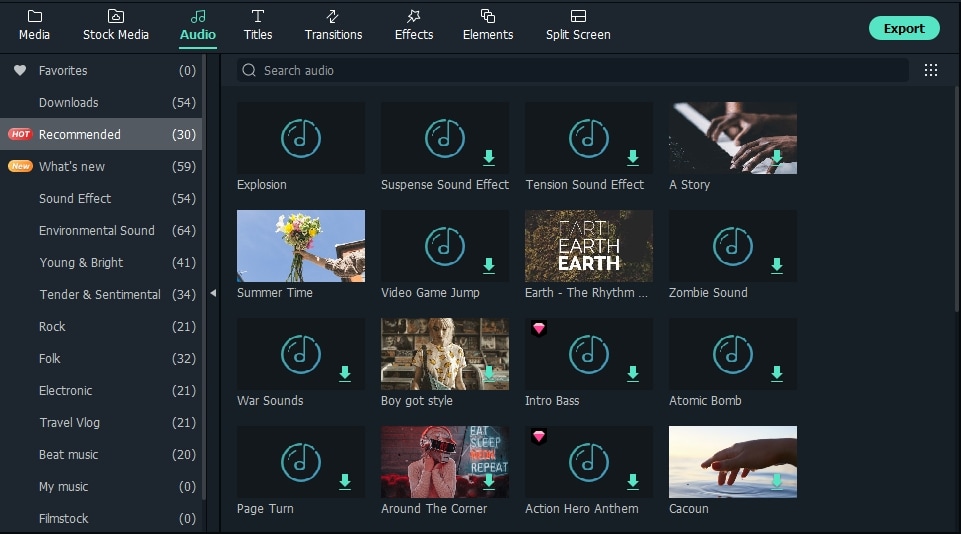
Part 2: How to change audio in video with Windows Movie Maker
The second method, Apart from replacing audio by Filmora, you can also make it by Windows Movie Maker. Though it is discontinued to develop a new version, you can still use it in Windows 7. Below are the steps to replace audio in Windows Movie Maker .
Step 1: Import video
First, download and run it. Click Add videos and photos to import video.
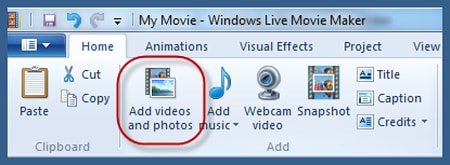
Step 2: Turn off the original sound
Click Edit tab > Video volume to turn off the sound by draging the slider to the left.
Step 3: Add audio to video
Click Add music to import the targeted music to Windows Movie Maker. You can select Add music or Add music at the current point.
Step 4: Save project
Click the file icon in the top left corner to save the video. Choose Save movie to export the targeted file.
Wondershare Filmora allows you to replace easily and edit the audio in the video
Unfortunately, no application by default on your desktop or laptop, phone, or tablet would get this done. To replace audio in the video, you would need the help of state of the art software. Fortunately, you have Wondershare Filmora at your disposal.
With Wondershare Filmora, you can replace audio in the video, mute audio, detach the audio, and add audio. You can eliminate background noise, organic noise, sound effects, address the sync problem in a video file, and edit the audio in a video without any extensive training or expertise.
- It has a user-friendly interface which makes things simple even for amateurs.
- It supports all common video and audio formats, including WMV, MOV, FLV, MTS, MP4, etc.
- You can move audio, replace it or add new audio to the video without worrying about general loss, which is loss of quality.
- You can export the edited video with the new or edited audio to various devices, including the cloud and social media sites.
- Compatible with Windows (including Windows 8) & Mac OS X (10.6 and above).
For Win 7 or later (64-bit)
For macOS 10.12 or later
02 How to change audio in video with Windows Movie Maker
Part 1: How to replace audio in video with Filmora
The first method, let us explore how you can replace audio in video with Wondershare Filmora.
To begin with, get a free trial copy of Wondershare Filmora .
For Win 7 or later (64-bit)
For macOS 10.12 or later
Step 1. Import file
Open the application and click ‘ Import once you have downloaded and installed Wondershare Filmora. Please search for the relevant video you wish to edit and load it from the hard disk or the specific folder. You can select multiple videos using ‘ctrl’ and clicking on the chosen files.

Step 2. Drag and drop to the video Timeline
The videos selected will be displayed as thumbnails. Choose a video, hit and click without releasing the click and drag the chosen video to the Video Timeline.

Step 3. Remove the original sound of the video
Right-click on it, and you would see the option of “Audio detach.” Click on it, and the audio file will detach from the video file and get added to Music Timeline.
Press “Delete” on your keyboard, and you will get rid of it. You can save this video without the audio, and you would only have the visuals, unimpaired and unaffected in any way, without the sound.

Step 4. Add a new audio track
You can add a new audio track to the video by choosing royalty sound or music from the Filmora library or importing any audio you like.

Part 2: How to change audio in video with Windows Movie Maker
The second method, Apart from replacing audio by Filmora, you can also make it by Windows Movie Maker. Though it is discontinued to develop a new version, you can still use it in Windows 7. Below are the steps to replace audio in Windows Movie Maker .
Step 1: Import video
First, download and run it. Click Add videos and photos to import video.

Step 2: Turn off the original sound
Click Edit tab > Video volume to turn off the sound by draging the slider to the left.
Step 3: Add audio to video
Click Add music to import the targeted music to Windows Movie Maker. You can select Add music or Add music at the current point.
Step 4: Save project
Click the file icon in the top left corner to save the video. Choose Save movie to export the targeted file.
Wondershare Filmora allows you to replace easily and edit the audio in the video
Unfortunately, no application by default on your desktop or laptop, phone, or tablet would get this done. To replace audio in the video, you would need the help of state of the art software. Fortunately, you have Wondershare Filmora at your disposal.
With Wondershare Filmora, you can replace audio in the video, mute audio, detach the audio, and add audio. You can eliminate background noise, organic noise, sound effects, address the sync problem in a video file, and edit the audio in a video without any extensive training or expertise.
- It has a user-friendly interface which makes things simple even for amateurs.
- It supports all common video and audio formats, including WMV, MOV, FLV, MTS, MP4, etc.
- You can move audio, replace it or add new audio to the video without worrying about general loss, which is loss of quality.
- You can export the edited video with the new or edited audio to various devices, including the cloud and social media sites.
- Compatible with Windows (including Windows 8) & Mac OS X (10.6 and above).
For Win 7 or later (64-bit)
For macOS 10.12 or later
02 How to change audio in video with Windows Movie Maker
Part 1: How to replace audio in video with Filmora
The first method, let us explore how you can replace audio in video with Wondershare Filmora.
To begin with, get a free trial copy of Wondershare Filmora .
For Win 7 or later (64-bit)
For macOS 10.12 or later
Step 1. Import file
Open the application and click ‘ Import once you have downloaded and installed Wondershare Filmora. Please search for the relevant video you wish to edit and load it from the hard disk or the specific folder. You can select multiple videos using ‘ctrl’ and clicking on the chosen files.

Step 2. Drag and drop to the video Timeline
The videos selected will be displayed as thumbnails. Choose a video, hit and click without releasing the click and drag the chosen video to the Video Timeline.

Step 3. Remove the original sound of the video
Right-click on it, and you would see the option of “Audio detach.” Click on it, and the audio file will detach from the video file and get added to Music Timeline.
Press “Delete” on your keyboard, and you will get rid of it. You can save this video without the audio, and you would only have the visuals, unimpaired and unaffected in any way, without the sound.

Step 4. Add a new audio track
You can add a new audio track to the video by choosing royalty sound or music from the Filmora library or importing any audio you like.

Part 2: How to change audio in video with Windows Movie Maker
The second method, Apart from replacing audio by Filmora, you can also make it by Windows Movie Maker. Though it is discontinued to develop a new version, you can still use it in Windows 7. Below are the steps to replace audio in Windows Movie Maker .
Step 1: Import video
First, download and run it. Click Add videos and photos to import video.

Step 2: Turn off the original sound
Click Edit tab > Video volume to turn off the sound by draging the slider to the left.
Step 3: Add audio to video
Click Add music to import the targeted music to Windows Movie Maker. You can select Add music or Add music at the current point.
Step 4: Save project
Click the file icon in the top left corner to save the video. Choose Save movie to export the targeted file.
Wondershare Filmora allows you to replace easily and edit the audio in the video
Unfortunately, no application by default on your desktop or laptop, phone, or tablet would get this done. To replace audio in the video, you would need the help of state of the art software. Fortunately, you have Wondershare Filmora at your disposal.
With Wondershare Filmora, you can replace audio in the video, mute audio, detach the audio, and add audio. You can eliminate background noise, organic noise, sound effects, address the sync problem in a video file, and edit the audio in a video without any extensive training or expertise.
- It has a user-friendly interface which makes things simple even for amateurs.
- It supports all common video and audio formats, including WMV, MOV, FLV, MTS, MP4, etc.
- You can move audio, replace it or add new audio to the video without worrying about general loss, which is loss of quality.
- You can export the edited video with the new or edited audio to various devices, including the cloud and social media sites.
- Compatible with Windows (including Windows 8) & Mac OS X (10.6 and above).
For Win 7 or later (64-bit)
For macOS 10.12 or later
02 How to change audio in video with Windows Movie Maker
Part 1: How to replace audio in video with Filmora
The first method, let us explore how you can replace audio in video with Wondershare Filmora.
To begin with, get a free trial copy of Wondershare Filmora .
For Win 7 or later (64-bit)
For macOS 10.12 or later
Step 1. Import file
Open the application and click ‘ Import once you have downloaded and installed Wondershare Filmora. Please search for the relevant video you wish to edit and load it from the hard disk or the specific folder. You can select multiple videos using ‘ctrl’ and clicking on the chosen files.

Step 2. Drag and drop to the video Timeline
The videos selected will be displayed as thumbnails. Choose a video, hit and click without releasing the click and drag the chosen video to the Video Timeline.

Step 3. Remove the original sound of the video
Right-click on it, and you would see the option of “Audio detach.” Click on it, and the audio file will detach from the video file and get added to Music Timeline.
Press “Delete” on your keyboard, and you will get rid of it. You can save this video without the audio, and you would only have the visuals, unimpaired and unaffected in any way, without the sound.

Step 4. Add a new audio track
You can add a new audio track to the video by choosing royalty sound or music from the Filmora library or importing any audio you like.

Part 2: How to change audio in video with Windows Movie Maker
The second method, Apart from replacing audio by Filmora, you can also make it by Windows Movie Maker. Though it is discontinued to develop a new version, you can still use it in Windows 7. Below are the steps to replace audio in Windows Movie Maker .
Step 1: Import video
First, download and run it. Click Add videos and photos to import video.

Step 2: Turn off the original sound
Click Edit tab > Video volume to turn off the sound by draging the slider to the left.
Step 3: Add audio to video
Click Add music to import the targeted music to Windows Movie Maker. You can select Add music or Add music at the current point.
Step 4: Save project
Click the file icon in the top left corner to save the video. Choose Save movie to export the targeted file.
Wondershare Filmora allows you to replace easily and edit the audio in the video
Unfortunately, no application by default on your desktop or laptop, phone, or tablet would get this done. To replace audio in the video, you would need the help of state of the art software. Fortunately, you have Wondershare Filmora at your disposal.
With Wondershare Filmora, you can replace audio in the video, mute audio, detach the audio, and add audio. You can eliminate background noise, organic noise, sound effects, address the sync problem in a video file, and edit the audio in a video without any extensive training or expertise.
- It has a user-friendly interface which makes things simple even for amateurs.
- It supports all common video and audio formats, including WMV, MOV, FLV, MTS, MP4, etc.
- You can move audio, replace it or add new audio to the video without worrying about general loss, which is loss of quality.
- You can export the edited video with the new or edited audio to various devices, including the cloud and social media sites.
- Compatible with Windows (including Windows 8) & Mac OS X (10.6 and above).
For Win 7 or later (64-bit)
For macOS 10.12 or later
How To Normalize Volume in VLC
How To Normalize Volume in VLC
How to normalize volume, why should we do it, and what is it after all? – these are the questions when it comes to editing our audio files, as well as the video clips we tend to change the sound of. So, first of all, the volume normalization is pretty much explained as follows: The process when a constant amount of gain is applied to the audio recording, bringing the amplitude to a desirable level, which is “the norm” for the project. If it is a little bit difficult to understand, we have to highlight that when this tool is applied to our volume, the whole recording has the same amount of gain across it, every piece affected the same way. Accordingly, when we normalize volume, the relative dynamics are not changed.
But, why bother at all and why not leave it the way it is? Well, the answer to this is almost the same as on why editing exists in general, right? Things are not perfect! This is the fact that prompts us to make our video clips and audio better, improve it at least on the level which can get us the right amount of viewers and listeners. Everyone have had some pain listening to several podcasts, when the volume was too high or too low, or there were so much background noise that the whole recording was hurting the ears of a person! People will not convert to being loyal subscribers, viewers and listeners if their user experience is not favored. So, it is in our best interest to serve their best interest, with a little bit of editing.
When it comes to normalizing audio, there are two reasons we refer to this tool. First is when we feel we need to get the maximum volume, and the second is when we need to match different volumes.
In the first case, you might have somewhat quite voice recording, and would like to make it better without changing its dynamic range, while making it as loud as possible. And when it comes to matching volumes, it is logical that you need to manipulate your editing this way in case you have a group of audio files, each or some of them are at different volumes, so, understandably, if not necessarily, you would like to make them come closer to the same volume.
So, until we give you the step-by step guide on how to normalize your volume in VLC player, we also need to inform you about audio normalization types. Here, generally, we come across three of them: a so-called peak normalization, helping adjust the recording based on the highest signal level present in the recording; another is called loudness normalization and it adjusts the recording based on perceived loudness. Last but not least, RMS (Root-Mean-Square), changes the value of all the samples, where their average electrical volume overall is a specified level.
Using any of this, making it better to listen to your voice, without people being annoyed and their ears becoming exhausting with what you have to offer, you will be making it enjoyable for them and easy to come back to your content, as they will not be obliged to change the volume on their own audio players. Instead, their experience with you will be calm and effortless, which you are aiming to achieve.
So, not, what about VLC? – this is a very popular media player, favorite for a lot of people all around the world, so you should already be quite familiar with what it is, at least by having streamed videos and movies there. Speaking more of what it represents, it is a free-to-use, robust, and feature-packed software that plays a wide range of audio, image, and video files. It is worth noting that it can also play multimedia files directly from extractable devices or the PC and additionally, the program can stream from popular websites such as Disney+, Hulu, Netflix, and so on.
As if it was not enough, you can do simple video and audio editing in VLC Media Player, which a lot of people are unaware of! For example, you can easily trim and cut videos. So, as it happens, we can also normalize volume in VLC Media Player. It is a very handy feature and it works on Windows as well as on Mac. Sooo… How to do that? Because, actually, it is so simple that you might be surprised you didn’t know about this earlier. To learn how to normalize volume in VLC, follow this simple guideline:
First, of course, as every time working with any software, you need to have VLC Media Player installed on your device. Once you have it installed, open VLC. Go to the Tools and Preferences and there, you will need to check the single box which is next to Normalize volume in Effects. Now, set the level to the one that works best for you. Then, when you are happy with the result, you can Save.
This is not something perfect, because it’s so simple to do and actually what it does is just help adjust the general volume, so it leaves the specifics alone.
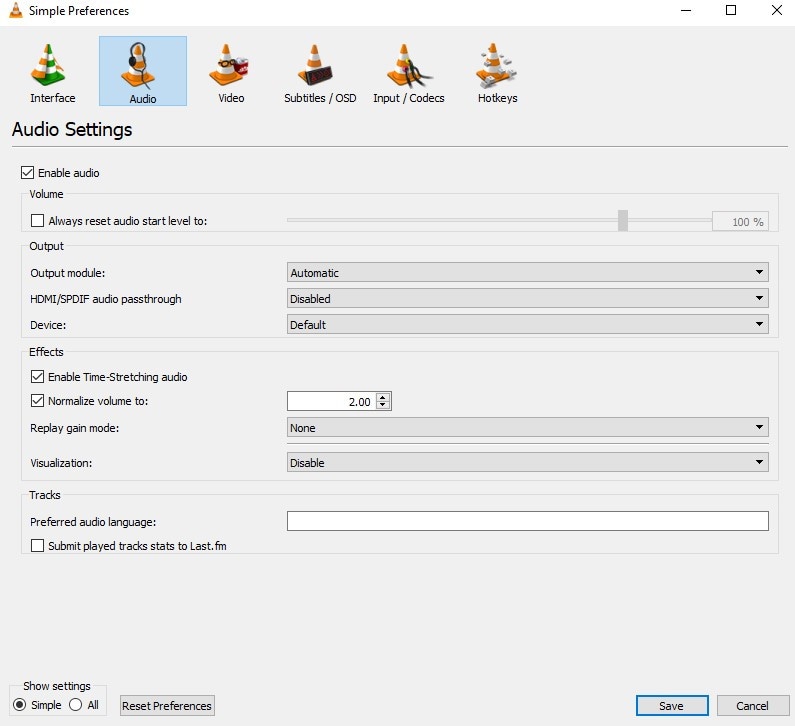
But, it might be the case that you are not so satisfied with the simple editing and want a little more to get from the editing process on VLC. So, you can do more with the Audio Effects menu there. And the steps are as follows:
First, on your VLC player, find Tools and then, in the menu, go to Preferences. The window will open, and there you need to select All in Show settings – actually it is a little bit hard to find because this is in the bottom left corner of the window. From there, you will need to navigate to Audio, and then, a little below, click on Filters and highlight it. The checkbox next to the Dynamic range compressor will probably be unchecked – so, check in it.
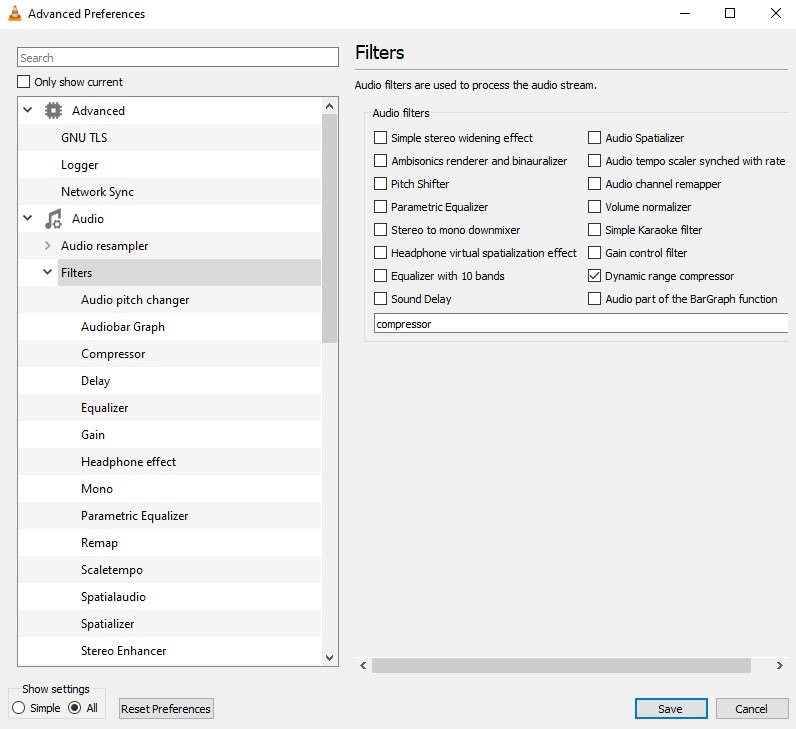
Next, see where Compressor is in the left panel? Select it. And now, you are free to make the changes to the levels as you see fit.
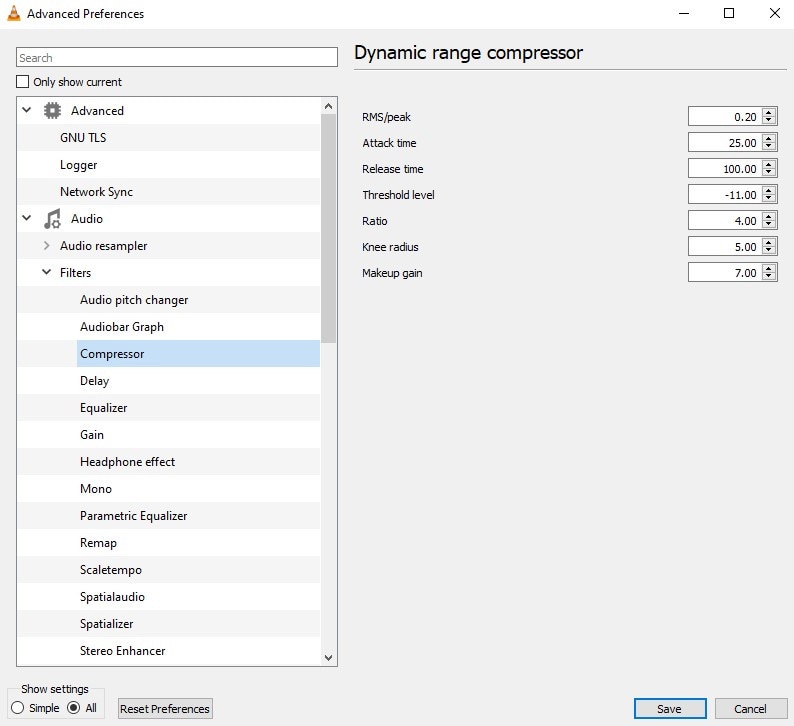
Here, if you are a little bit overwhelmed with the wide range of options to work on, you can just concentrate the most on Makeup gain, Threshold, and Ratio. The first one is by which you adjust in quiet sequences to raise the volume, the second will help you reduce louder sequences to even things out, and ratio is the maximum level of all audio within a movie, let’s say.
Don’t underestimate Attack time and release time, either. They graduate the changes to ramp them up at first, then down again, rather than initiating them immediately. So, if you set them to your liking as well, this will ensure that you have a more fluid transition in and out of the scene and there are less sudden, sometimes scary volume changes.
Therefore, you are now equipped with the most information you will need to normalize volume in VLC Player – so free to give it a go, play around with the different settings and carry out the best result imaginable for you!
How to normalize audio in Wondershare Filmora?
Now, even though we already know how to normalize audio in VLC in the simplest, as well as in the more advanced way, it might be even better if we know some more about normalizing audios in different programs. Something worth discussing is a software called Wondershare Filmora , which carries out the same task wonderfully. Although, unlike VLC Media Player, it is a real video editor , but don’t panic if you have never laid your hand on editing – it is one of the easiest to use ini the word, operating also both on Mac and Windows, and its interface is utterly understandable for beginners right away. And, actually, it is a qhile that Wondershare Filmora X introduced the feature to normalize the audio for the first time. What to say more - you might want to stop now and download the latest version of Filmora because now we are about to learn how to normalize audio from the video there – so, tune in 
Free Download For macOS 10.14 or later
When it is done installing, open the software. Now, click and drag the video of which the audio you want to normalize. Now you can select the clip you have chosen – if there are multiple, select all of them, then right-click and choose Detach Audio.
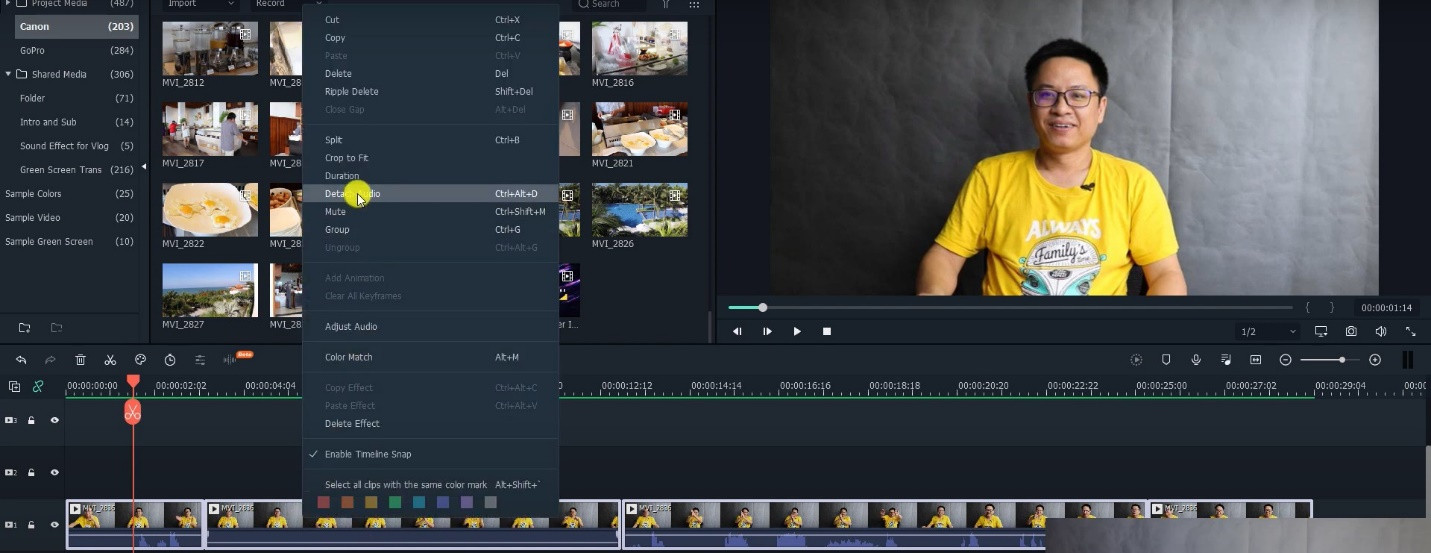
Now if you have this kind of graphic before your eyes, you can be pretty sure without even listening, that the noises are really, really different from each other, which highlights once again how useful audio normalization can be:

Select these files, right-click and choose Adjust Audio. New panel will be opened on left top and there, you will see Audio Normalization – check the box there.
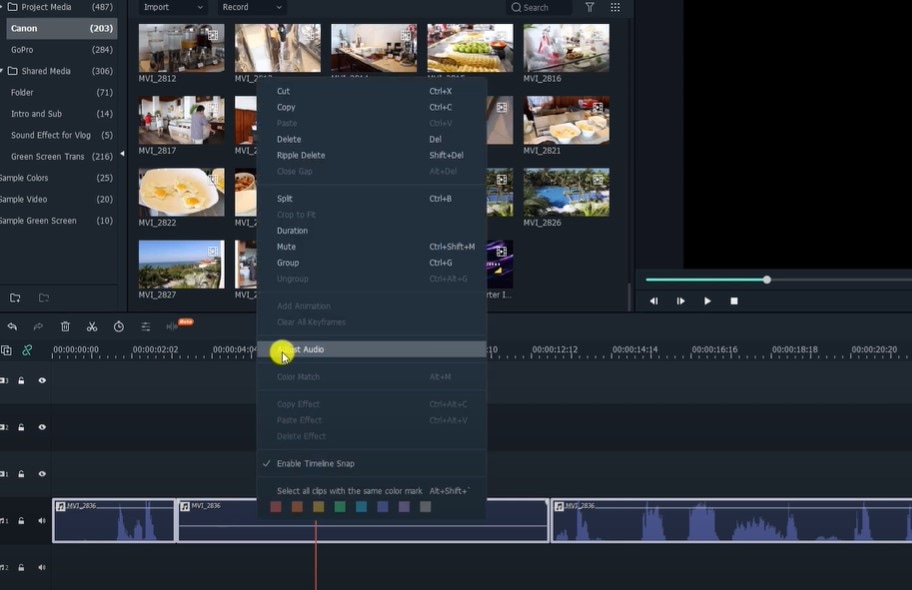
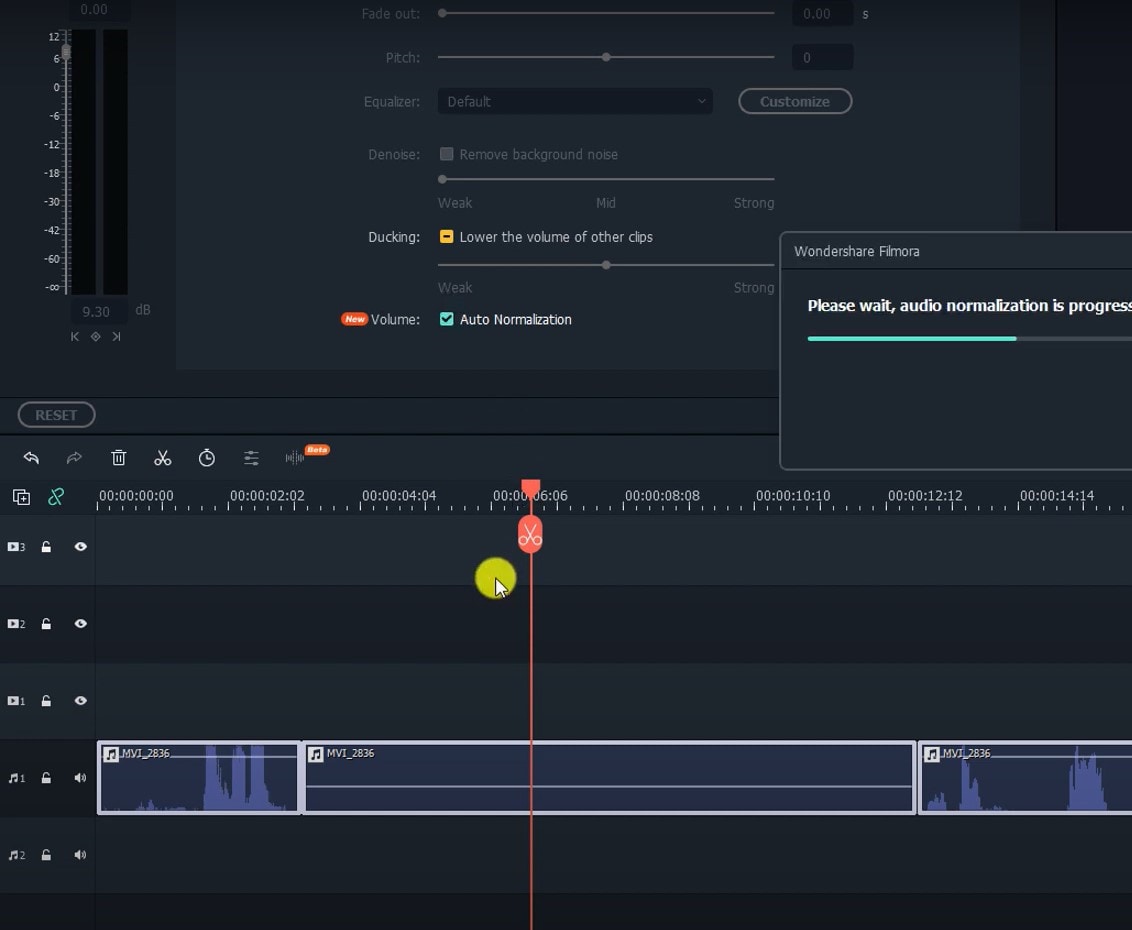
After you have clicked on it, wait until the normalization completes.

Soon, all audio will be normalized, and you will already be able to see on the graphics that the volumes are almost on the same level and when you listen to it, you will make sure that there is no longer apparent difference between how they sound. And from there on, you can save the file you just normalized!
So, in this article, we learned a lot about normalizing volumes, why and how it is done, and, more specifically, how to get this task completed in VLC Media Player as well as in Wondershare Filmora X. you can proceed to putting this new information into a good use and come back to learn more about video and audio editing here 
When it is done installing, open the software. Now, click and drag the video of which the audio you want to normalize. Now you can select the clip you have chosen – if there are multiple, select all of them, then right-click and choose Detach Audio.

Now if you have this kind of graphic before your eyes, you can be pretty sure without even listening, that the noises are really, really different from each other, which highlights once again how useful audio normalization can be:

Select these files, right-click and choose Adjust Audio. New panel will be opened on left top and there, you will see Audio Normalization – check the box there.


After you have clicked on it, wait until the normalization completes.

Soon, all audio will be normalized, and you will already be able to see on the graphics that the volumes are almost on the same level and when you listen to it, you will make sure that there is no longer apparent difference between how they sound. And from there on, you can save the file you just normalized!
So, in this article, we learned a lot about normalizing volumes, why and how it is done, and, more specifically, how to get this task completed in VLC Media Player as well as in Wondershare Filmora X. you can proceed to putting this new information into a good use and come back to learn more about video and audio editing here!
Also read:
- [Updated] Influential VR Development Studios
- 4 Quick Ways to Transfer Contacts from Apple iPhone 8 to iPhone With/Without iTunes | Dr.fone
- How to Watch Hulu Outside US On Xiaomi Civi 3 Disney 100th Anniversary Edition | Dr.fone
- In 2024, How to Unlock Vivo Y55s 5G (2023) Phone Pattern Lock without Factory Reset
- In 2024, Unlocking Made Easy The Best 10 Apps for Unlocking Your Oppo A59 5G Device
- New Pioneering Audio Creation with LexisEdit A Beginners Blueprint
- Updated 2024 Approved A Soundtrack Journey Unveiling 10 Key Spots to Get Your Digital Music
- Updated Converting Audacity Projects to MP3 Format
- Updated In 2024, Virtual Vistas of Calm Top Ten Online Journeys for Mental Clarity and Stress Relief This Year
- Updated Top 5 Digital Audio Editors for Optimal Sound Quality for 2024
- Winxvideo AI: Beschleunigen Sie Das Umwandeln Von Videos Und Audios Mit Der Power Der GPU
- Title: Updated 2024 Approved 5 Leading Digital Audio Workstation Options for Professional Guitarists, Updated
- Author: Ella
- Created at : 2025-02-26 04:08:59
- Updated at : 2025-03-04 09:06:51
- Link: https://sound-optimizing.techidaily.com/updated-2024-approved-5-leading-digital-audio-workstation-options-for-professional-guitarists-updated/
- License: This work is licensed under CC BY-NC-SA 4.0.

